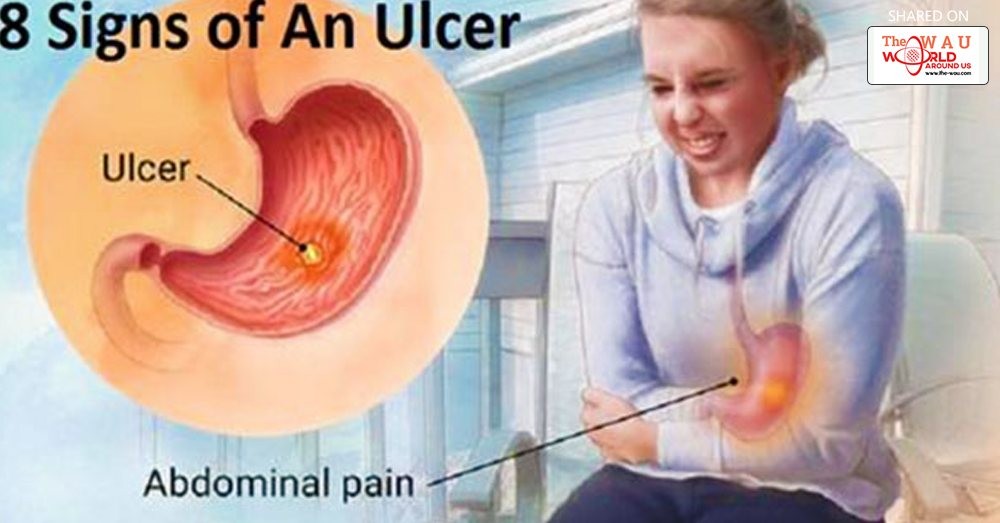Peptic ulcers are open sores that grow on the inside lining of the stomach and the upper portion of our small intestine. One of the most common symptom of a peptic ulcer is stomach pain.
Peptic ulcers include:
Gastric ulcers that occur on the inside of the stomach
Duodenal ulcers that occur on the inside of the upper portion of the duodenum [small intestine]
The most common reasons of peptic ulcers are infection with the bacterium Helicobacter pylori (H. pylori) and long-term use of aspirin and certain other painkillers, such as ibuprofen (Advil, Motrin, others) and naproxen sodium (Aleve, Anaprox, others). Stress and spicy foods do not cause peptic ulcers. Nonetheless, they can make your symptoms worse.
Peptic ulcers happen when acid in the digestive tract eats away at the inner surface of the stomach or small intestine. The acid can create a painful open sore that may bleed.
Your digestive tract is coated with a mucous layer that normally protects against acid. But if the amount of acid is increased or the amount of mucus is lowered, you could develop an ulcer.
Here are the 8 Signs and Symptoms of a Stomach Ulcer You Must Not Ignore
1. STOMACH PAIN
Pain in the abdomen, typically between the breastbone and belly button region, may follow a meal as the stomach empties. The pain will often come and go in waves of burning or stabbing pain.
Depending upon the severity of the condition, the pain can last for a few minutes to several hours. Also, the pain can come and go for days or weeks. However, keep in mind that stomach ulcers are not always painful. At times, people suffering from this problem do not experience stomach pain but may experience other symptoms.
2. HEARTBURN
Heartburn is usually a symptom of acid reflux disease, but it may also be related with a stomach ulcer. If the burning sensation in the chest starts to subside with water or an over-the-counter antacid, then it is not a matter of concern.
Nonetheless, consistent heartburn, regardless of what you eat, may indicate a stomach ulcer. Heartburn due to an ulcer also causes you to burp or hiccup excessively after eating. As heartburn causes a lot of discomfort, see a doctor to find out the exact cause and treat it immediately.
3. INDIGESTION
Stomach ulcer can cause terrible indigestion and gas pain, which usually means burping and hiccupping following meals.
4. NAUSEA
Due to an imbalance of digestive juices, you will likely feel mild to severe nausea with an ulcer, typically first thing in the morning on an empty stomach.
5. STOOL DISCOLORATION
A change in stool color is another clear sign of a peptic ulcer. In fact, you should seek urgent medical advice if you pass dark, sticky and tar-like stools. Bleeding in the stomach due to an ulcer can lead to a change in the stool color, ranging from light yellow to black.
This change in color, and also consistency, occurs due to the chemical reactions to blood within the intestine that are caused by digestive enzymes. When an ulcer is getting more severe, your stool can even carry tinges of blood and appear pasty or darker. As the color of your stool says a lot about your health, any change in stool color should be reported to your doctor.
6. BLOATING
It’s quite common as an ulcer develops to feel a sensation of heaviness or fullness in the belly, similar to a weight or the burdensome feeling you get after consuming a lot of water. Bloating is another initial symptom of a stomach ulcer. Individuals who suffer from ulcer often complain of a feeling of bloating, specifically in their midsection.
Bloating accompanied by abdominal pain, swelling in the abdomen and a feeling of fullness may be another tip-off to this condition. You may also have the urge to burp a lot more often than usual, even without eating anything. Unexplained abdominal bloating continuing on-and-off over a long period of time is never a good sign. Consult your doctor about the problem immediately.
7. LOSS OF APPETITE
The unexpected and sharp stomach pains that most ulcer patients feel a few hours after a meal (during the digestion phase) will often cause them to fear eating or totally lose their appetites.
8. UNEXPLAINED WEIGHT LOSS
With a loss of appetite naturally comes sudden weight loss due to lack of eating. You may also suffer from a sudden weight loss if your ulcer is causing you to vomit frequently after meals.
Share This Post















